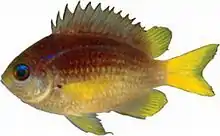Chromis enchrysura
The yellowtail reef fish (Chromis enchrysura) is a species of damselfish in the family Pomacentridae.
| Chromis enchrysura | |
|---|---|
 | |
| Scientific classification | |
| Domain: | Eukaryota |
| Kingdom: | Animalia |
| Phylum: | Chordata |
| Class: | Actinopterygii |
| Family: | Pomacentridae |
| Genus: | Chromis |
| Species: | C. enchrysura |
| Binomial name | |
| Chromis enchrysura (D. S. Jordan & C. H. Gilbert, 1882) | |
It is native to the Atlantic Ocean.
Occasionally, they are found in the aquarium trade.
Distribution and habitat
This species of fish is native to the Atlantic Ocean.
It is also found partially around the Indian Ocean.[2]
Western Atlantic Ocean populations are found around the Gulf of Mexico, the Bahamas, the Caribbean Sea, and Brazil.[2]
In the eastern Atlantic Ocean, they are found in western Africa, from the Canary Islands down to Angola.[2]
The population in the Indian Ocean is found around South Africa.[2]
Description
Adults can grow up to a maximum size of 10 centimetres (3.9 in).[2]
They have 13 dorsal spines, 11 to 13 dorsal soft rays, 2 anal spines, and 11 to 13 anal soft rays.[2]
Colouring
This fish is mainly brown.
Its pectoral, caudal, and the backs of its dorsal and anal fins are yellow. The area around the top of its eyes are purple. The rest of the fish is white.
References
- Rocha, L.A.; Myers, R. (2015). "Chromis enchrysura". IUCN Red List of Threatened Species. 2015: e.T188315A1856668. doi:10.2305/IUCN.UK.2015-4.RLTS.T188315A1856668.en. Retrieved 20 November 2021.
- Froese, Rainer; Pauly, Daniel (eds.) (2014). "Chromis enchrysura" in FishBase. October 2014 version.
Further reading
- Schobernd, Christina; Sedberry, George (January 2009). "Shelf-Edge and Upper-Slope Reef Fish Assemblages in the South Atlantic Bight: Habitat Characteristics, Spatial Variation, and Reproductive Behavior". Bulletin of Marine Science. 84 (1): 67–92.
- Emery, A R; Smith-Vaniz, W F (1982). "Geographic Variation and Redescription of the Western Atlantic Damselfish Chromis Enchrysura Jordan and Gilbert (Pisces: Pomacentridae)". Bulletin of Marine Science. 32 (1): 151–165. Retrieved 27 May 2015.
